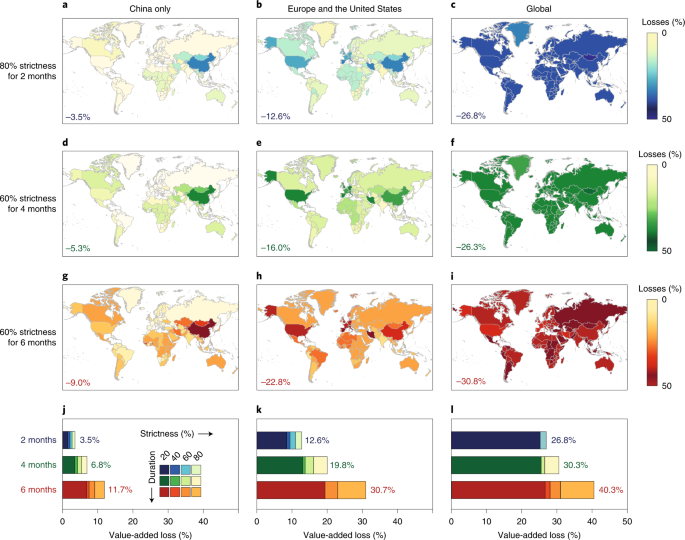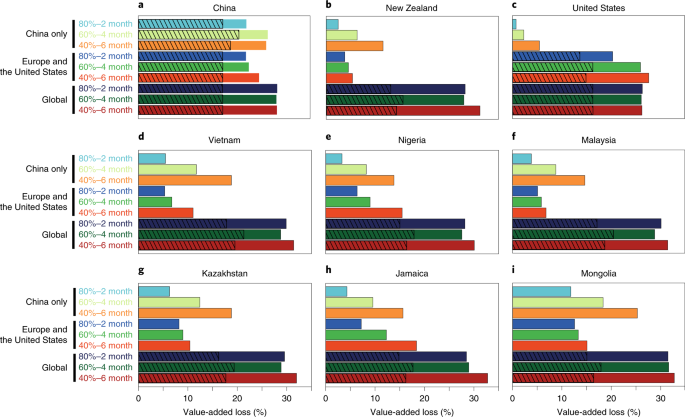On June 3, 2020, Professor GUAN Dabo's research group from the Department of Earth System Science (DESS) of Tsinghua University and many domestic and foreign research institutions jointly published a research paper entitled Global supply-chain effects of COVID-19 control measures in Nature Human Behaviour. This paper is the world's first peer-reviewed study on the impact of pandemic control measures on the global industrial chain. The evaluation results of this study show that although China has suffered huge losses in the active fight against the pandemic, it has minimized the duration of the pandemic, which has had a significant beneficial impact on other countries in the world, and China has implemented strict management and orderly liberalization measures. Is also in the best interest of the global economy, and played a decisive role in the restart of the global economy and the recovery of the industrial chain.
In addition to verifying the effectiveness and implementation costs of prevention and control measures, studying the impact of different prevention and control measures on the world economy and global key industrial chains is also of great significance for mitigating economic losses and guiding economic recovery. This study uses the newly developed global disaster footprint accounting model, combined with global trade and industrial chain databases, to quantitatively assess the impact of the pandemic on more than 140 countries and the key to more than 140 countries around the world from a series of scenarios such as setting the scope of spatial transmission, the rigor of control measures, and the duration. The economic impact of the industrial chain more comprehensively reveals how the economic losses related to COVID-19 will be shared in the global supply chain. The research can provide governments with data support and scientific basis for formulating appropriate pandemic prevention and control measures and accelerating the process of economic recovery.

Figure.1 Maps of the results from 9 scenarios out of the first three sets of 36 modelled scenarios, with different combinations of spatial spread

Figure 2. Economic loss (measured by the percentage of value-added losses) in the following nine selected countries
The research results show that, first of all, strict prevention and control measures are not the main cause of economic losses. If countries adopt strict and effective control measures to shorten the duration of the pandemic, it will reduce global economic losses. Secondly, the transmission effect of the industry chain amplifies the economic impact of the pandemic on some countries. Countries that are not directly affected by the pandemic may also suffer huge economic losses. Especially low- and middle-income countries are more vulnerable to indirect economic impacts, such as energy exports. Central Asian countries and the Caribbean region, which is dominated by tourism. At the same time, key industrial chains around the world have been severely affected by the pandemic. In view of the closeness of the industrial chain, the interruption of the industrial chain and the decline in terminal consumer demand have led to a global industry decline, such as the Chinese electronics manufacturing industry and the German automobile manufacturing Production is expected to fall by 13%-53% and 2%-49% respectively; and after the pandemic is initially controlled, the process of global economic restart should be gradual. Research believes that if the rapid "unblocking" causes the pandemic to go out of control again, the global economy will suffer Even worse losses.

Figure 3. The results from three post-pandemic recovery scenarios
Pandemic prevention and control are public goods with positive externalities. No country can be left alone. The country’s active prevention and control attitude and strict and effective prevention and control measures can reduce the economic losses of itself and other trading partners. Therefore, in the current severe global pandemic, it is particularly important to prevent and control the pandemic. Only by strengthening international cooperation and making up for weak links in global prevention and control can economic losses be minimized and the health and well-being of all mankind can be guaranteed.
Original link: https://www.nature.com/articles/s41562-020-0896-8